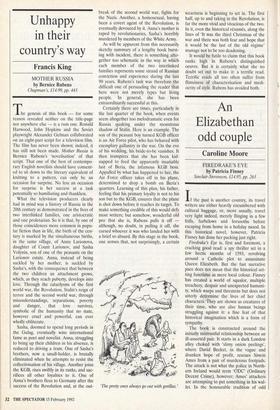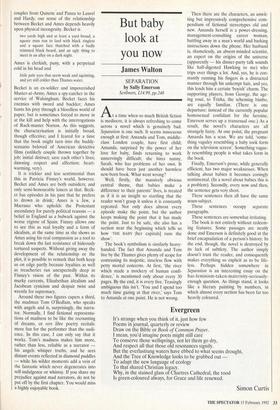An Elizabethan odd couple
Caroline Moore
FIREDRAKE'S EYE by Patricia Finney Sinclair-Stevenson, f14.95, pp. 263 If the past is another country, its travel writers are either heavily encumbered with cultural baggage, or, more usually, travel very light indeed, merely flinging in a few frills, furbelows and forsooths before escaping from home in a holiday mood. In this historical novel, however, Patricia Finney has done her packing just right.
Firedrake's Eye is, first and foremost, a cracking good read: a spy thriller set in a few hectic months of 1593, revolving around a Catholic plot to assassinate Queen Elizabeth. But the fast narrative pace does not mean that the historical set- ting functions as mere local colour. Finney has created a world of squalor, multiple treachery, despair and unexpected humani- ty, which warps and threatens but does not utterly determine the lives of her chief characters. They are shown as creatures of their time, who are also human beings struggling against it: a fine feat of that historical imagination which is a form of sympathy.
The book is constructed around the initially mistrustful relationship between an ill-assorted pair. It starts in a dark London alley choked with 'slimy onion peelings', where David Becket, in the vague and drunken hope of profit, rescues Simon Ames from a pair of murderous footpads. The attack is not what the police in North- ern Ireland would term 'ODC' (Ordinary Decent Crime), however; Ames' attackers are attempting to put something in his wal- let. In the honourable tradition of odd couples from Quixote and Panza to Laurel and Hardy, our sense of the relationship between Becket and Ames depends heavily upon physical incongruity. Becket is
two yards high and at least a yard broad, a square man run to lard with black ringlets and a square face thatched with a badly trimmed black beard, and an ugly thing to meet in an alley on a dark night.
Ames is clerkish, puny, with a perpetual cold in his head and
little pale eyes that seem weak and squinting, and yet still colder than Thames water.
Becket is an ex-soldier and impoverished Master-at-Arms; Ames a spy-catcher in the service of Walsingham. Becket faces his enemies with sword and buckler; Ames hunts his prey through a bloodless world of paper, but is sometimes forced to move in at the kill and help with the interrogations of Rack-master Norton. As this suggests, the characterisation is initially broad, though effective; and I feared for a time that the book might turn into the buddy- scenario beloved of American detective films (unlikely couple thrown together by job; initial distruct; save each other's lives; dawning respect and affection; heart- warming, very).
It is trickier and less sentimental than this in Patricia Finney's world, however. Becket and Ames are both outsiders; and only semi-honourable loners at that. Beck- et has episodes in his past that he prefers to drown in drink; Ames is a Jew, a Marrano who upholds the Protestant ascendancy for purely political reasons — a belief in England as a bulwark against the worse regime of Spain. Finney allows one to see this as real loyalty and a form of idealism, at the same time as she shows us Ames using his real compassion as a tool to break down the last resistance of hideously tortured suspects. Without giving away the development of the relationship or the plot, it is possible to remark that both keep us on edge partly because loyalties as well as treacheries run unexpectedly deep in Finney's vision of the past. Within its murky currents, Elizabethan idealism and Jacobean cynicism and despair twist and wrestle for supremacy.
Around these two figures capers a third, the madman Tom O'Bedlam, who speaks with angels and is, surprisingly, the narra- tor. Normally, I find fictional representa- tions of madness to be like the recounting of dreams, or vers libre poetry recitals: more fun for the performer than the audi- ence. In this case, I can only say that it
works. Tom's madness makes him more, rather than less, reliable as a narrator his angels whisper truths, and he sees distant events reflected in diamond puddles — while his wilder moments add a vein of the fantastic which never degenerates into self-indulgence or whimsy. If you share my prejudice against mad narrators, do not be put off by the first chapter. You would miss a highly enjoyable book.



























































 Previous page
Previous page